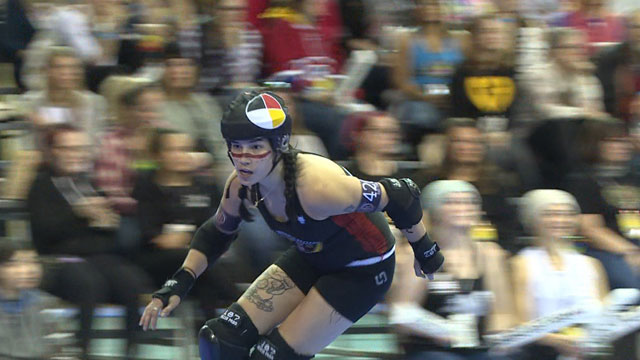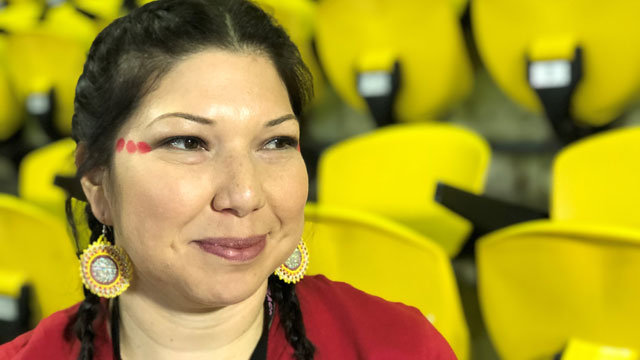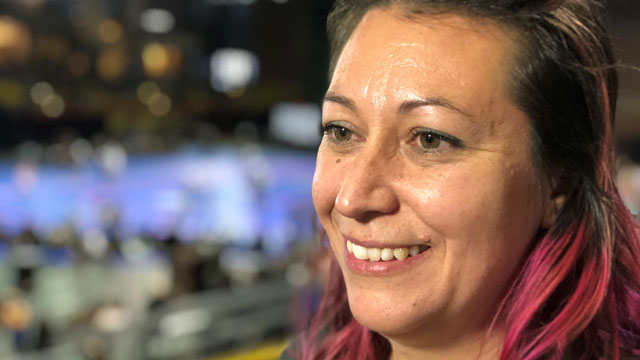Lindsay Richardson
APTN News
Inside the Claude-Robillard sports complex in Montreal, two borderless nations faced off in a full-contact, high intensity clash as part of the Women’s Flat Track Derby Association (WFTDA) International Championships Tournament – the Olympics of roller derby, according to the players.
It’s not the kind of competition you see every day.
The exposition game, called We Are Nation: A Game Without Borders pegged the Jewish Roller Derby against Team Indigenous, a multinational group now in its second year of play.
The team of 15 players, and support staff – represent over 20 First Nations worldwide.
Last year, they competed in the Roller Derby World Cup in Manchester, U.K.
(Ashley “Ashtray” McDermaid in action at the roller derby tournament in Montreal. APTN file photo)
This year, they’re among the “cream of the crop” of roller derby skaters – one of 12 teams selected to compete under the banner of “world’s best.”
For members of Team Indigenous, however, the competition provides an invaluable platform for advocacy.
“We are creating an opportunity to showcase two very diverse teams who descend from peoples who have been forcibly removed from their homelands and continued to build lives and communities despite their situation,” explained Team Indigenous co-founder April Fournier, following a moment of silence and traditional territorial acknowledgement.
The game itself is complex, and not for the faint of heart.
Played in two 30 minute periods, players make their way around a circuit track during two minute “jams,” where scoring players – identifiable with either a glittery Star of David or a medicine wheel on their helmet – try to avoid blockers to score points.
It often means players like “Kris Myass” or “Ash Tray,” had to pick themselves up off the floor time again, and again.
But between time-outs, the team reminded themselves – and everyone else – of who they are by chanting “Strong. Resilient. Indigenous.”
Here are some of their stories.
“A great equalizer”
April Fournier, AKA ‘Jumpy McGee’
Portland, Maine
Co-founder, Team Indigenous
It’s a misleading nickname: Fournier’s not a jumper.
“You will probably never see me leap an apex, and that’s okay,” she said. “And I’m not Scottish either.”
Along with Mick Wagoner, or “Mick Swagger,” Fournier helped create Team Indigenous two years ago – motivated by a desire to share sports and rec with a team of women who also share similar worldviews and experience.
Together, the team videoconferences from their respective locations: Vancouver, New York, Maine, New Mexico, Arizona, Florida, and Alaska among them.
Practice, Fournier says, is often not held until the eleventh hour.
“I’ve never had a team that you only see each other once or twice a year, but you can come together and put everything together on the track,” she said. “It’s just created this really great global family that we have now.”
“Having eight wheels under you is a great equalizer. It’s not all about your size, it’s not even about having roller skated forever – you still have to learn to move dynamically, to learn gameplay, to learn good teamwork, to be able to listen to your teammates and listen to your own body and kinda know how to navigate the track,” Fournier explained.
While the team continues to recruit across borders, and across realities, Fournier concedes that some Indigenous women may be deterred from the sport because the costs it incurs.
To bridge this gap, Native Montreal distributed 10 weekend-long passes to the derby championship games this past weekend. Watching the game roll out in real time, with real camaraderie, may inspire future skaters, Fournier said.
“When you have marginalized communities that may live in poverty or may not have the same access to resources, you miss out on a lot of really great talent,” she added.
“Now that we know there’s talent everywhere, our allies and those people who have privilege can go back to their own communities and start to help these teams and elevate these teams.”
“It’s really powerful”
Jennifer Bennett, AKA ‘Windigo’
Wikwemkong, Ontario
Manager/Multitasker, Team Indigenous
Jennifer Bennett’s career on wheels began long before Team Indigenous was founded.
Once the only Indigenous woman skating with Team Canada, her derby name references a past life competing in high-intensity games as a particularly ferocious ‘blocker.’
When she first took up the sport, Bennett says she was inspired by a “derby hero,” an Asian-American skater from Texas dubbed “Rice Rocket,” whose chosen nom de plume comically confronted racial preconceptions.
“I thought it was just hilarious that she was re-taking a stereotype and flipping it around and owning it,” Bennett explained. “I didn’t want to do something generic like ‘tipi-something’ – I wanted [my name] to be unique to my culture.”
“Windigos are monsters in our culture. So then that was like my derby persona,” she added.
In retirement, Bennett took on a less physical role with Team Indigenous – that of coach, team manager, and PR manager.
“To the skaters, this team feels like a sisterhood; it’s a lot less stressful than their home, competitive teams where different power dynamics can play out. We’re here supporting each other.”
The game’s technical training can take years; for some, according to Bennett, it’s an opportunity to celebrate Indigeneity through sport and sisterhood.
“Some people are very deep in their culture, some people are raised in their culture, they were separated, some people are a generation removed from it,” Bennett said.
“We help people, bring them back and help them reconnect with their culture – and also we’re doing the same sport as each other,” Bennett explained. “It’s through that framework that people are being reconnected. It’s really powerful”
“You can come in with nothing”
Michelle Cross, AKA ‘Squarrior’
Kahnawake Mohawk Territory, Quebec
Wrangler, Team Indigenous
When Michelle Cross, a veteran of the Montreal roller derby scene, founded the “Wagon Burners” out of Kahnawake Mohawk Territory in 2015, it was the first-ever Indigenous roller derby team competing at the local level.
While some were initially stunned by Cross’ choice of derby name – “Squarrior,” an appropriation of the racial slur – she was joined by other equally theatrical players like “Pocahotass” or “Blockade Babe.”
“It took off and I was shocked, I made so many amazing new sisters through this team that I probably wouldn’t have even met in our community,” Cross explained.
Success, however, was short-lived; the team disbanded after only a few years of spirited local competitions.
But recently, there have been murmurings in the community about re-launching a roller derby team, possibly bolstered by Team Indigenous’ successful track record.
“It was very uplifting to watch it,” Cross said of the team’s victory on Saturday.
“My advice would be to try it. You don’t have to be a certain body type, you don’t have to be a certain height, you don’t have to have any skill, it’s a sport where you can come in with nothing and gain everything from.
@sentimtl
Photos: Robbie Purdon/APTN













